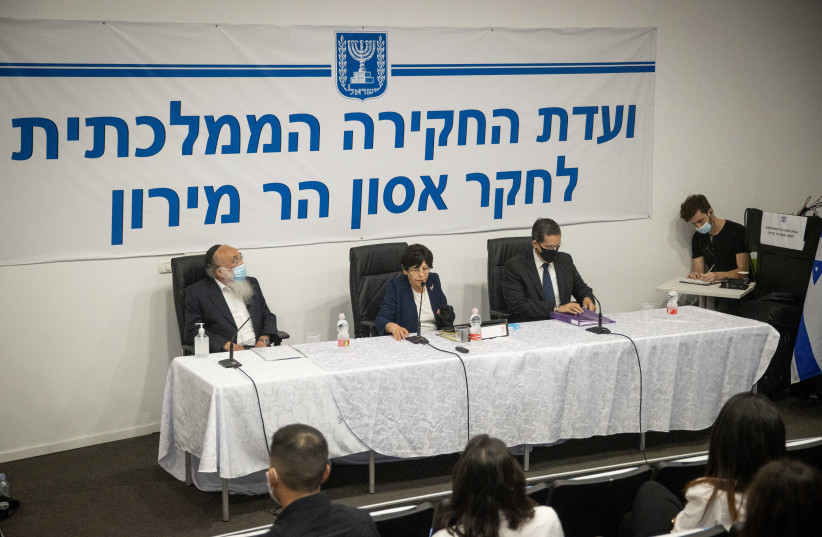Politicians blocked all attempts by the police to limit attendance on the site during Lag Ba’omer celebrations, a senior police officer told the Mount Meron disaster state commission of inquiry Sunday.
Northern District Police Superintendent Shimon Lavi, who gave a highly emotional account of how the tragedy evolved, was the opening witness before the commission, which is expected to hear from political, religious and security officials and from injured victims.
The commission is expected to hear testimony on Monday from Lavi’s predecessor as northern police commander, Alon Asur, and Rabbi Shmuel Rabinowitz, rabbi of the Western Wall and the Holy Sites.
On April 30, some 45 men and boys, mostly haredim (ultra-Orthodox), died in a mass crush on Mount Meron near the tomb of Talmudic sage Shimon Bar Yochai in Israel’s deadliest civilian disaster. Tens of thousands of pilgrims had gathered for the annual Lag Ba’omer celebrations.
The government of former prime minister Benjamin Netanyahu and haredi parties, which were at least partially involved in demanding unlimited attendance, had refused to establish a state commission of enquiry that would be free of political interference.

This was in contravention of the wishes of the majority of the families of the victims who said only a truly independent panel would be able to find who was responsible for the death of their loved ones and prevent such a disaster in the future.
Some of the haredi officials had advocated improved infrastructure in the past, but few had been ready to limit the number of attendees, and none of them wanted an inquiry that would point fingers at them.
While there had been some expectation that the coronavirus crisis would force the government to limit attendance, the first wave of vaccines was being administered.
The new government of Prime Minister Naftali Bennett promptly endorsed a commission of inquiry. At the end of June, Supreme Court President Esther Hayut appointed a three-member panel to chair the Meron disaster commission of inquiry.
The commission is chaired by former chief justice Miriam Naor, and the other two members are Rabbi Mordechai Karlitz and IDF Maj.-Gen. (ret.) Shlomo Yanai.
Each of the commission members asked Lavi some hard questions on Sunday.
Yanai cited a 2017 police report that said no more than 9,000 people could be on the Meron site safely. But Lavi had allowed more than 25,000 people onto the site, he said.
Lavi responded with two main points.
First, the police had revised their view because the site had been enlarged since 2017, he said.
Second, every time he or his predecessors had tried to limit attendees and bonfires, and to increase safety measures, there was political and haredi pushback demanding that police would not interfere with how worshipers conduct themselves, he said.
Lavi seemed to say he was able to place limits on the number of bonfires despite political pressure, but he was less successful in limiting the number of attendees.
Former public security minister Amir Ohana and various religious figures pressed him to be more flexible, Lavi said.
Naor asked him what he would do differently in the future.
“We need to restart everything about events at Meron,” Lavi said. “We need to change the location of the bonfires, the parking, to change everything. We need to pave streets and [build] infrastructure. The area is too small.”
Naor asked him if he would agree to hold the Lag Ba’omer celebrations at Meron next year if major changes had not yet occurred.
Lavi said he would not and that a hard line must be taken for reforms and against political pressure that undermined public safety.
When the commission’s members were announced, Hayut said a state inquiry of this kind would ensure independence from political considerations and restore public faith in the state’s handling of the issue.
Naor was picked due to her judicial stature and her experience handling highly complex matters, the government said in a statement.
Rabbi Karlitz was selected for having served as mayor of Bnei Brak and having experience in building and design issues, with the Meron events in general and with public policy and the haredi community regarding integration in the IDF.
Yanai was selected due to his expertise in logistical and planning issues, both during his service in the IDF and in the private sector since his retirement from the military.
Hayut said she had announced the inquiry on the 17th of Tamuz, a fast day commemorating the Roman breach of the walls of Jerusalem in 70 CE. She expressed hope that the Meron commission would counter that breach by restoring some positivity and stability to Israeli society.
